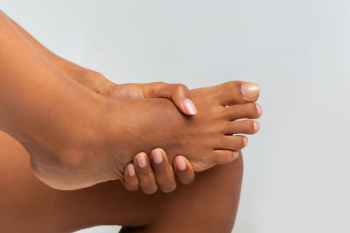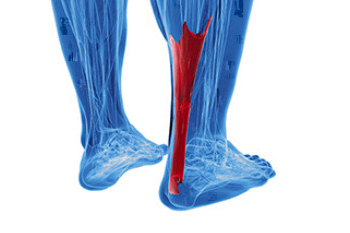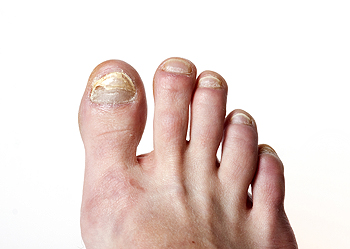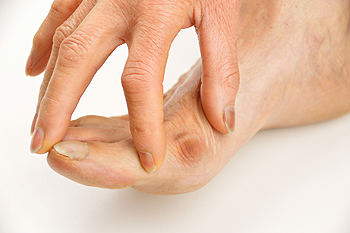Items filtered by date: June 2024
Caregiver Help in Everyday Foot Care
 Caregivers play a vital role in maintaining the foot and toenail health of those they assist. Regular inspection of the feet is important, checking for any signs of redness, swelling, cuts, or infections. Toenails should be trimmed straight across to prevent ingrown toenails, and the edges can be gently filed to remove sharp corners. Keeping feet clean and dry helps prevent fungal infections, while moisturizing can prevent dry, cracked skin. It is also important to ensure that shoes and socks fit properly to avoid pressure points and blisters. Elevating the feet periodically can improve circulation, especially for those who are less mobile. Any signs of infection or persistent foot problems should be addressed promptly. If you are a caregiver, it is suggested that you include a podiatrist on the healthcare team to ensure specialized care and early intervention for any foot-related issues.
Caregivers play a vital role in maintaining the foot and toenail health of those they assist. Regular inspection of the feet is important, checking for any signs of redness, swelling, cuts, or infections. Toenails should be trimmed straight across to prevent ingrown toenails, and the edges can be gently filed to remove sharp corners. Keeping feet clean and dry helps prevent fungal infections, while moisturizing can prevent dry, cracked skin. It is also important to ensure that shoes and socks fit properly to avoid pressure points and blisters. Elevating the feet periodically can improve circulation, especially for those who are less mobile. Any signs of infection or persistent foot problems should be addressed promptly. If you are a caregiver, it is suggested that you include a podiatrist on the healthcare team to ensure specialized care and early intervention for any foot-related issues.
Everyday foot care is very important to prevent infection and other foot ailments. If you need your feet checked, contact Harvey Jacobs, DPM from Quality Foot Care Center. Our doctor can provide the care you need to keep you pain-free and on your feet.
Everyday Foot Care
Often, people take care of their bodies, face and hair more so than they do for their feet. But the feet are a very important aspect of our bodies, and one that we should pay more attention to. Without our feet, we would not be able to perform most daily tasks.
It is best to check your feet regularly to make sure there are no new bruises or cuts that you may not have noticed before. For dry feet, moisturizer can easily be a remedy and can be applied as often as necessary to the affected areas. Wearing shoes that fit well can also help you maintain good foot health, as well as making it easier to walk and do daily activities without the stress or pain of ill-fitting shoes, high heels, or even flip flops. Wearing clean socks with closed shoes is important to ensure that sweat and bacteria do not accumulate within the shoe. Clean socks help to prevent Athlete’s foot, fungi problems, bad odors, and can absorb sweat.
If you have any questions please feel free to contact our office located in Somerset, NJ . We offer the newest diagnostic and treatment technologies for all your foot and ankle needs.
Achilles Tendon Ruptures in Sports Activities

Achilles tendon ruptures are a significant injury that can often affecting athletes engaged in high-impact sports like basketball, soccer, and tennis. This injury happens when the tendon connecting the calf muscles to the heel bone tears, typically during a sudden acceleration, jump, or change in direction. The rupture results in immediate pain, swelling, and an inability to push off the foot or stand on tiptoe. Risk factors include inadequate warm-up, tight calf muscles, and previous tendonitis. Early diagnosis and treatment are important and may include surgical repair for optimal recovery. Preventative measures, such as regular stretching, strengthening exercises, and wearing appropriate footwear, can reduce the risk of an Achilles tendon rupture. If you have endured this type of injury, it is suggested that you schedule an appointment with a podiatrist who can successfully treat an Achilles tendon injury.
Achilles tendon injuries need immediate attention to avoid future complications. If you have any concerns, contact Harvey Jacobs, DPM of Quality Foot Care Center. Our doctor can provide the care you need to keep you pain-free and on your feet.
What Is the Achilles Tendon?
The Achilles tendon is a tendon that connects the lower leg muscles and calf to the heel of the foot. It is the strongest tendon in the human body and is essential for making movement possible. Because this tendon is such an integral part of the body, any injuries to it can create immense difficulties and should immediately be presented to a doctor.
What Are the Symptoms of an Achilles Tendon Injury?
There are various types of injuries that can affect the Achilles tendon. The two most common injuries are Achilles tendinitis and ruptures of the tendon.
Achilles Tendinitis Symptoms
- Inflammation
- Dull to severe pain
- Increased blood flow to the tendon
- Thickening of the tendon
Rupture Symptoms
- Extreme pain and swelling in the foot
- Total immobility
Treatment and Prevention
Achilles tendon injuries are diagnosed by a thorough physical evaluation, which can include an MRI. Treatment involves rest, physical therapy, and in some cases, surgery. However, various preventative measures can be taken to avoid these injuries, such as:
- Thorough stretching of the tendon before and after exercise
- Strengthening exercises like calf raises, squats, leg curls, leg extensions, leg raises, lunges, and leg presses
If you have any questions please feel free to contact our office located in Somerset, NJ . We offer the newest diagnostic tools and technology to treat your foot and ankle needs.
Are You Suffering From Ingrown Toenails?
Causes of Toenail Fungus
 Toenail fungus, also known as onychomycosis, is caused by a fungal infection. It can also be triggered by psoriasis, a chronic autoimmune skin disorder that affects the skin and nails, causing thickening, scaling, and inflammation. When psoriasis affects the nails, it can create pits, ridges, and discoloration, making them more likely to develop a fungal infection. Fungi thrive in warm, moist environments, such as sweaty socks and shoes. Additionally, fungi can be picked up by walking barefoot in communal spaces, such as locker rooms or swimming pool areas. Individuals with a weakened immune system, diabetes, or poor circulation are more likely to develop issues with toenail fungus. Injuries to the toenail, such as ongoing pressure or trauma, may provide opportunities for fungi to infect the nail bed. Practicing good foot hygiene, wearing breathable footwear, and avoiding walking barefoot in public areas can help prevent exposure to toenail fungus. If an infection occurs, it is suggested to seek prompt treatment from a podiatrist to prevent it from spreading and to restore the health of your toenails.
Toenail fungus, also known as onychomycosis, is caused by a fungal infection. It can also be triggered by psoriasis, a chronic autoimmune skin disorder that affects the skin and nails, causing thickening, scaling, and inflammation. When psoriasis affects the nails, it can create pits, ridges, and discoloration, making them more likely to develop a fungal infection. Fungi thrive in warm, moist environments, such as sweaty socks and shoes. Additionally, fungi can be picked up by walking barefoot in communal spaces, such as locker rooms or swimming pool areas. Individuals with a weakened immune system, diabetes, or poor circulation are more likely to develop issues with toenail fungus. Injuries to the toenail, such as ongoing pressure or trauma, may provide opportunities for fungi to infect the nail bed. Practicing good foot hygiene, wearing breathable footwear, and avoiding walking barefoot in public areas can help prevent exposure to toenail fungus. If an infection occurs, it is suggested to seek prompt treatment from a podiatrist to prevent it from spreading and to restore the health of your toenails.
If left untreated, toenail fungus may spread to other toenails, skin, or even fingernails. If you suspect you have toenail fungus it is important to seek treatment right away. For more information about treatment, contact Harvey Jacobs, DPM of Quality Foot Care Center. Our doctor can provide the care you need to keep you pain-free and on your feet.
Symptoms
- Warped or oddly shaped nails
- Yellowish nails
- Loose/separated nail
- Buildup of bits and pieces of nail fragments under the nail
- Brittle, broken, thickened nail
Treatment
If self-care strategies and over-the-counter medications does not help your fungus, your podiatrist may give you a prescription drug instead. Even if you find relief from your toenail fungus symptoms, you may experience a repeat infection in the future.
Prevention
In order to prevent getting toenail fungus in the future, you should always make sure to wash your feet with soap and water. After washing, it is important to dry your feet thoroughly especially in between the toes. When trimming your toenails, be sure to trim straight across instead of in a rounded shape. It is crucial not to cover up discolored nails with nail polish because that will prevent your nail from being able to “breathe”.
In some cases, surgical procedure may be needed to remove the toenail fungus. Consult with your podiatrist about the best treatment options for your case of toenail fungus.
If you have any questions, please feel free to contact our office located in Somerset, NJ . We offer the newest diagnostic and treatment technologies for all your foot care needs.
Bunion Relief
 A bunion is a bony bump that forms on the joint at the base of the big toe, causing it to deviate towards the other toes. This condition, known as hallux valgus, can result from genetic predisposition, wearing tight or narrow shoes, arthritis, or stress on the foot. Symptoms include pain, swelling, redness, and difficulty in walking. Additionally, the skin over the bunion may gradually become thickened and tender. Diagnosis typically involves a physical examination and X-rays to assess the severity and underlying bone structure. Treatment options range from conservative methods such as wearing wider shoes, using orthotic devices, and taking anti-inflammatory medications, to more invasive procedures like bunion surgery for severe cases. Untreated bunions can lead to complications such as chronic pain, bursitis, hammertoe, and difficulty finding comfortable footwear. If you have a bunion that is causing you discomfort, it is suggested that you schedule an appointment with a podiatrist for a tailored treatment plan.
A bunion is a bony bump that forms on the joint at the base of the big toe, causing it to deviate towards the other toes. This condition, known as hallux valgus, can result from genetic predisposition, wearing tight or narrow shoes, arthritis, or stress on the foot. Symptoms include pain, swelling, redness, and difficulty in walking. Additionally, the skin over the bunion may gradually become thickened and tender. Diagnosis typically involves a physical examination and X-rays to assess the severity and underlying bone structure. Treatment options range from conservative methods such as wearing wider shoes, using orthotic devices, and taking anti-inflammatory medications, to more invasive procedures like bunion surgery for severe cases. Untreated bunions can lead to complications such as chronic pain, bursitis, hammertoe, and difficulty finding comfortable footwear. If you have a bunion that is causing you discomfort, it is suggested that you schedule an appointment with a podiatrist for a tailored treatment plan.
If you are suffering from bunions, contact Harvey Jacobs, DPM of Quality Foot Care Center. Our doctor can provide the care you need to keep you pain-free and on your feet.
What Is a Bunion?
A bunion is formed of swollen tissue or an enlargement of boney growth, usually located at the base joint of the toe that connects to the foot. The swelling occurs due to the bones in the big toe shifting inward, which impacts the other toes of the foot. This causes the area around the base of the big toe to become inflamed and painful.
Why Do Bunions Form?
Genetics – Susceptibility to bunions are often hereditary
Stress on the feet – Poorly fitted and uncomfortable footwear that places stress on feet, such as heels, can worsen existing bunions
How Are Bunions Diagnosed?
Doctors often perform two tests – blood tests and x-rays – when trying to diagnose bunions, especially in the early stages of development. Blood tests help determine if the foot pain is being caused by something else, such as arthritis, while x-rays provide a clear picture of your bone structure to your doctor.
How Are Bunions Treated?
- Refrain from wearing heels or similar shoes that cause discomfort
- Select wider shoes that can provide more comfort and reduce pain
- Anti-inflammatory and pain management drugs
- Orthotics or foot inserts
- Surgery
If you have any questions, please feel free to contact our office located in Somerset, NJ . We offer the newest diagnostic and treatment technologies for all your foot care needs.

